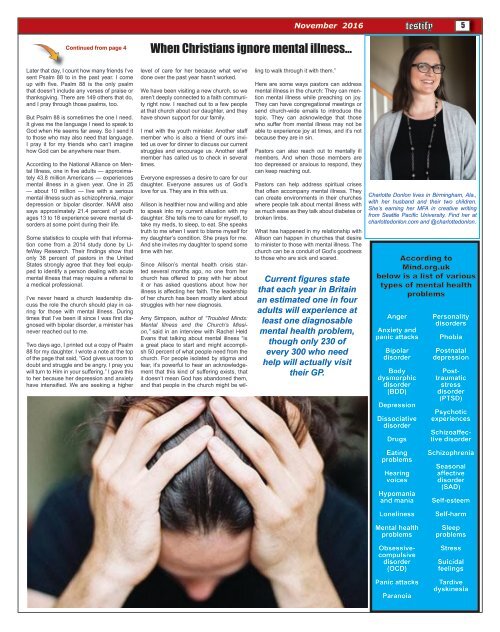You also want an ePaper? Increase the reach of your titles
YUMPU automatically turns print PDFs into web optimized ePapers that Google loves.
November 2016 testify<br />
5<br />
Continued from page 4<br />
When Christians ignore mental illness...<br />
Later that day, I count how many friends I’ve<br />
sent Psalm 88 to in the past year. I come<br />
up with five. Psalm 88 is the only psalm<br />
that doesn’t include any verses of praise or<br />
thanksgiving. There are 149 others that do,<br />
and I pray through those psalms, too.<br />
But Psalm 88 is sometimes the one I need.<br />
It gives me the language I need to speak to<br />
God when He seems far away. So I send it<br />
to those who may also need that language.<br />
I pray it for my friends who can’t imagine<br />
how God can be anywhere near them.<br />
According to the National Alliance on Mental<br />
Illness, one in five adults — approximately<br />
43.8 million Americans — experiences<br />
mental illness in a given year. One in 25<br />
— about 10 million — live with a serious<br />
mental illness such as schizophrenia, major<br />
depression or bipolar disorder. NAMI also<br />
says approximately 21.4 percent of youth<br />
ages 13 to 18 experience severe mental disorders<br />
at some point during their life.<br />
Some statistics to couple with that information<br />
come from a 2014 study done by LifeWay<br />
Research. Their findings show that<br />
only 38 percent of pastors in the United<br />
States strongly agree that they feel equipped<br />
to identify a person dealing with acute<br />
mental illness that may require a referral to<br />
a medical professional.<br />
I’ve never heard a church leadership discuss<br />
the role the church should play in caring<br />
for those with mental illness. During<br />
times that I’ve been ill since I was first diagnosed<br />
with bipolar disorder, a minister has<br />
never reached out to me.<br />
Two days ago, I printed out a copy of Psalm<br />
88 for my daughter. I wrote a note at the top<br />
of the page that said, “God gives us room to<br />
doubt and struggle and be angry. I pray you<br />
will turn to Him in your suffering.” I gave this<br />
to her because her depression and anxiety<br />
have intensified. We are seeking a higher<br />
level of care for her because what we’ve<br />
done over the past year hasn’t worked.<br />
We have been visiting a new church, so we<br />
aren’t deeply connected to a faith community<br />
right now. I reached out to a few people<br />
at that church about our daughter, and they<br />
have shown support for our family.<br />
I met with the youth minister. Another staff<br />
member who is also a friend of ours invited<br />
us over for dinner to discuss our current<br />
struggles and encourage us. Another staff<br />
member has called us to check in several<br />
times.<br />
Everyone expresses a desire to care for our<br />
daughter. Everyone assures us of God’s<br />
love for us. They are in this with us.<br />
Allison is healthier now and willing and able<br />
to speak into my current situation with my<br />
daughter. She tells me to care for myself, to<br />
take my meds, to sleep, to eat. She speaks<br />
truth to me when I want to blame myself for<br />
my daughter’s condition. She prays for me.<br />
And she invites my daughter to spend some<br />
time with her.<br />
Since Allison’s mental health crisis started<br />
several months ago, no one from her<br />
church has offered to pray with her about<br />
it or has asked questions about how her<br />
illness is affecting her faith. The leadership<br />
of her church has been mostly silent about<br />
struggles with her new diagnosis.<br />
Amy Simpson, author of “Troubled Minds:<br />
Mental Illness and the Church’s Mission,”<br />
said in an interview with Rachel Held<br />
Evans that talking about mental illness “is<br />
a great place to start and might accomplish<br />
50 percent of what people need from the<br />
church. For people isolated by stigma and<br />
fear, it’s powerful to hear an acknowledgement<br />
that this kind of suffering exists, that<br />
it doesn’t mean God has abandoned them,<br />
and that people in the church might be willing<br />
to walk through it with them.”<br />
Here are some ways pastors can address<br />
mental illness in the church: They can mention<br />
mental illness while preaching on joy.<br />
They can have congregational meetings or<br />
send church-wide emails to introduce the<br />
topic. They can acknowledge that those<br />
who suffer from mental illness may not be<br />
able to experience joy at times, and it’s not<br />
because they are in sin.<br />
Pastors can also reach out to mentally ill<br />
members. And when those members are<br />
too depressed or anxious to respond, they<br />
can keep reaching out.<br />
Pastors can help address spiritual crises<br />
that often accompany mental illness. They<br />
can create environments in their churches<br />
where people talk about mental illness with<br />
as much ease as they talk about diabetes or<br />
broken limbs.<br />
What has happened in my relationship with<br />
Allison can happen in churches that desire<br />
to minister to those with mental illness. The<br />
church can be a conduit of God’s goodness<br />
to those who are sick and scared.<br />
Current figures state<br />
that each year in Britain<br />
an estimated one in four<br />
adults will experience at<br />
least one diagnosable<br />
mental health problem,<br />
though only 230 of<br />
every 300 who need<br />
help will actually visit<br />
their GP.<br />
Charlotte Donlon lives in Birmingham, Ala.,<br />
with her husband and their two children.<br />
She’s earning her MFA in creative writing<br />
from Seattle Pacific University. Find her at<br />
charlottedonlon.com and @charlottedonlon.<br />
According to<br />
Mind.org.uk<br />
below is a list of various<br />
types of mental health<br />
problems<br />
Anger<br />
Anxiety and<br />
panic attacks<br />
Bipolar<br />
disorder<br />
Body<br />
dysmorphic<br />
disorder<br />
(BDD)<br />
Depression<br />
Dissociative<br />
disorder<br />
Drugs<br />
Personality<br />
disorders<br />
Phobia<br />
Postnatal<br />
depression<br />
Posttraumatic<br />
stress<br />
disorder<br />
(PTSD)<br />
Psychotic<br />
experiences<br />
Schizoaffective<br />
disorder<br />
Eating<br />
problems<br />
Hearing<br />
voices<br />
Hypomania<br />
and mania<br />
Loneliness<br />
Mental health<br />
problems<br />
Obsessivecompulsive<br />
disorder<br />
(OCD)<br />
Panic attacks<br />
Paranoia<br />
Schizophrenia<br />
Seasonal<br />
affective<br />
disorder<br />
(SAD)<br />
Self-esteem<br />
Self-harm<br />
Sleep<br />
problems<br />
Stress<br />
Suicidal<br />
feelings<br />
Tardive<br />
dyskinesia



